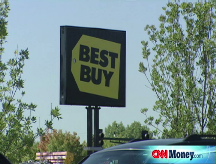Retail shakeout: 'Worst is yet to come'
Experts warn that the credit freeze combined with slumping sales - and a likely dismal Christmas season - will force out many more retailers in 2009.
NEW YORK (CNNMoney.com) -- The credit market freeze has added to an incredibly tough sales year for U.S. retailers, and analysts warn that these challenges are just the beginning of what could be a brutal 2009 for merchants.
"The worst is yet to come," said Howard Davidowitz, chairman of Davidowitz & Associates Inc., a retail consulting and investment banking firm.
"We'll see some tried and true [retail] names disappear," said Marti Kopacz, managing principal with corporate advisory and restructuring firm Grant Thornton.
Prior to the credit crunch, retailers were already struggling with softening sales as higher gas prices and falling home equity forced Americans to curtail purchases.
Last month's sales at stores open at least a year, which is a key measure of a retailer's performance known as same-store sales, rose just 0.8%, according to sales tracker Thomson Financial. Forecasts were for a 1.5% increase, according to Thomson.
Analysts say same-store sales of 3% or higher typically reflect a healthy U.S. consumer. Since consumer spending fuels two-thirds of the nation's economy, such a low same-store sales number is a bad sign.
What's more, since the beginning of this year, more than two dozen store chains have succumbed to a spending slump and either filed for Chapter 11 bankruptcy protection or gone out of business for good.
Now, retailers must cope with the credit markets being locked up too. This, Kopacz said, will further hinder consumers' ability to shop in the weeks and months ahead, and impede retailers' ability to run their business.
Kopacz predicts that, as a result, the industry could eventually lose between 10% and 15% of stores next year.
Claire Gruppo, co-founder and managing director of independent investment firm Gruppo, Levey and Co.,
thinks retailers are heading for a dismal fourth quarter, especially if Christmas sales shrink.
The November-to-December holiday gift-buying months can account for as much as 50% of merchants' annual profits and sales.
If holiday sales are indeed weaker, Gruppo fears that many retailers will find their banks even less willing to lend. "Lenders will remain very skittish and either reduce their credit lines to merchants or pull the existing line of credit altogether," Gruppo said.
That's a huge problem since credit is the lifeblood of retailers. Retailers rely on credit to buy merchandise for their stores.
On top of that, the credit freeze will limit retailers' ability to obtain short-term loans from banks to pay their vendors, and long-term loans to grow their business.
Retailers will also see tightening of credit by their suppliers, explained Grant Thornton's Kopacz.
"If a month ago you bought merchandise on 30-day terms, the supplier would let [the retailer] pay in 45 days. Now they want payment in 30 days, " she said.
"Every retailer who goes to renew their credit agreement will face tougher [terms] that will make it extremely expensive to borrow," Kopacz said.
"[Retail] sectors that are heavily dependent on discretionary spending will be hit the hardest," said Kopacz.
Although she declined to name specific firms due to confidentiality agreements, she said the jewelry, household appliances, furniture and restaurant sector could see trouble.
"Clothing sellers, supermarket chains and anyone in the home improvement space such as Home Depot (HD, Fortune 500) and Lowe's will probably do ok," she said.
Davidowitz, however, thinks department stores, home furnishings and specialty names are most at risk of bankruptcy or store closings.
"Anyone who is fortunate to have lots of cash on the balance sheet will survive," said David Solomon, president and CEO of NAI ReStore, the retail arm of NAI Global, a retail development and commercial real estate firm.
Discounters Wal-Mart (WMT, Fortune 500), Target, Costco and drugstore chains CVS and Walgreens aren't threatened, he said. In fact, these sellers are benefiting as more cost-conscious consumers trade down to their lower-priced goods.
Fewer merchants means fewer choices for consumers, and that's usually not a good thing if it results in a drop in spending," Solomon said.
Gruppo had a different view. She said the retail shakeout is long overdue because "there are too many brands that don't have a compelling reason to exist."
It's bad for the consumer who may also be a retail employee, she said. "If I work in retailing, I would be freaking out right now," she said.
On a macro level, a flood of retail bankruptcies next year will push up unemployment and that not good for the overall economy, Gruppo said.
"It's going to be very ugly in 2009," she said. ![]()


